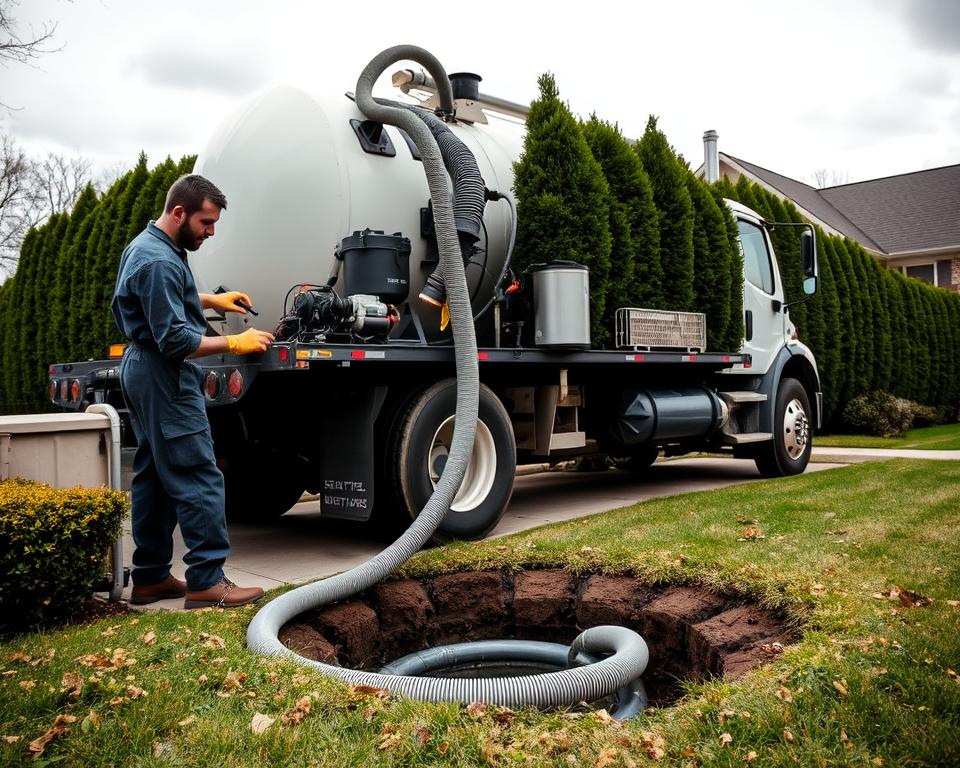Septic Tank Pump Swap: The Essential Guide
Have you ever thought about the fallout of a Septic Tank Pump shutdown? For many, it’s a event that creates major distress and sudden expenses. Identifying the necessity for quick replacement is critical in maintaining a smooth and clean Septic system. By observing periodic check-ups, including swift repair needs, you prolong your system’s life while avoiding costly emergencies. Companies like All in Sanitation serve a pivotal function in keeping your Septic tank operating smoothly. This guide aims to provide a concise overview of Septic Tank Pump replacement, including indication signs and service pointers for septic air pump.
Core Findings
- Understanding the job of a Septic Tank Pump is important for homeowners.
- Early Septic Tank Pump replacement can lower overall spending.
- Routine service and cleaning are central to prolonging the lifespan of your Septic system.
- Expert help can successfully tackle Septic system Pump repair and maintenance.
- Detecting initial symptoms of Pump failure can avoid expensive fixes.
Septic System Basics
A Septic system is essential for homes without access to town sewer networks. It treats and disposes of household wastewater responsibly. The Septic tank is core to this system’s operation, acting as a key component in the process.
The Septic tank takes in sewage, splitting solids from lighter matter. This split is essential for proper wastewater treatment. The treated water then travels to the drain field, where it undergoes further cleansing by the soil, shielding groundwater.
Grasping how your Septic system operates can improve its life and efficiency. Routine maintenance is essential for the Septic tank and the system’s overall performance. Homeowners must learn about their system’s components to reduce ecological impact and avoid expensive fixes.
Septic Tank Explained
A Septic tank is a in-ground, sealed container central to household waste management systems. It’s important to understand the Septic tank’s main purpose: it deals with sewage waste storage by conditioning it. This setup operates by isolating solids from liquids, fostering basic wastewater treatment and sanitation.
Its operation hinges on naturally occurring microorganisms that decompose waste. In locales without centralized sewage treatment, Septic tanks are crucial. They hold sewage long enough for solids to settle, forming sludge. Meanwhile, liquid effluent rises to the top, preparing for filtration in the drainage field.
Preserving a Septic tank in sound shape is essential for its performance and life expectancy. Consistent servicing is necessary to stopping troubles like backups and overflows. These problems can cause pricey restorations and pose risks to the environment. In essence, Septic tanks hold a key place in keeping things clean and safe, especially in rural areas.

How to Tell a Pump Needs Replacing
Homeowners should be mindful of signs that their Septic tank may need a new Pump. A strong sign is experiencing foul odors around drains or in the outdoor area, signaling a system failure. Suffering recurring or severe sewage backups in your home calls for immediate action to stop worse issues.
Seeing slow draining drains indicates a potential problem. Sinks, showers, or toilets that empty slowly might indicate a Pump failure or a clog needing an expert’s evaluation. Additionally, sections of unusually lush vegetation in your yard could indicate trouble; this shows waste leakage, leading to overflow concerns.
To prevent large, pricey repairs, homeowners should tackle these clues immediately. Conducting routine checks and maintenance is essential for the Septic system’s top function.
| Signs | Description |
|---|---|
| Foul Odors | Unpleasant smells around drains or yard signaling system failure. |
| Sewage Backup | Regular sewage returns in sinks or toilets pointing to potential Pump issues. |
| Slow Draining Drains | Fixtures draining slowly can indicate blockages or Pump malfunction. |
| Lush Vegetation | Areas of extra-green grass near the tank signaling possible overflow. |
How Often Should You Replace Your Septic Pump?
Knowing the frequency for replacing your Septic Pump is key for a efficient Septic system. It’s sensible to have your system checked every three years. A trained technician during these reviews provides information into how well your system functions.
In most cases, pumping out the Septic tank becomes required every five years. However, households with extensive use or a big family might need service more often. Diligent service of your Septic system avoids high restoration costs and increases its lifespan. Professionals in Septic services can develop a maintenance plan that matches your household load and the details of your system.
Keeping on top with Septic Pump replacements guarantees your system’s efficient operation and protects your home investment. Consistent checks and care sidestep surprise expenses. They keep your Septic system working smoothly.
Replacement Cost Breakdown
The Septic Pump replacement cost differs, shaped by many factors. Homeowners should budget for an amount of $500 to $1,300 for a new Pump. This price band accounts for variations in the style of Pump and material needs. It’s vital to account for the Pump and Septic tank servicing costs for the installation and mandatory inspections.
Costs can also rise due to problems within the Septic system or local labor charges. Essential repairs, triggered by wear or harm, could drive up the total outlay. In evaluating financial estimates for Septic services, factor in charges for routine care, assessments, and any unforeseen emergencies since these factors strongly support maintaining your system’s longevity.
Budgeting for periodic Septic service lessens the surprise of unforeseen costs. Advance planning helps owners in covering expenses connected with the Pump’s replacement and system upkeep.
Pump Replacement Procedure
The Septic Tank Pump replacement starts with a comprehensive inspection of the system. This initial check identifies any additional issues other than the Pump itself. The worn-out Pump is then removed carefully and promptly.
Installing the new Pump entails precise attention to securing connections, making sure no leaks. Specialist firms see that the installation is carried out right, lowering future issues.
The last step is a complete wrap-up review. It confirms effective operation, providing homeowners security. With skilled support, the process is smooth, with little disturbance.
Pump Installation Guidelines
When performing Septic Pump installation, it’s critical to observe best practices. Engaging experienced experts ensures compliance with local regulations. They expertly manage the installation intricacies, eliminating errors common in inexperienced setups.
Following strict Septic service standards is crucial for harmonious performance. Choosing appropriate components and high-grade materials extends the Pump’s life and improves the Septic system’s efficiency. This meticulous attention enhances maintenance and overall performance longevity.
- Go with a trusted service provider who focuses in Septic systems.
- Make certain that all necessary permits and inspections are in place before work begins.
- Select Pumps that meet the specific requirements of your Septic system.
- Include a pre-installation inspection to review site conditions.
- Pay attention to the layout and flow of the Septic system during installation.
Following these guidelines ensures a seamless setup. It also secures a steady system for efficient waste handling.
Caring for Your Septic System
Preventing high bills with your Septic system commences with regular maintenance. By employing simple guidelines, homeowners can preserve their Septic systems’ efficiency. Arranging routine inspections is a good idea. It helps identify and tackle problems before they become serious.
It’s also vital to not allow flushing dangerous items down the drain. Cooking oil, chemicals, and items that don’t break down can damage your system. Reducing water use during peak times can also improve system handling.
Scheduling expert services with entities like All in Sanitation is important for Septic health. Understanding what you should and shouldn’t do with your Septic tank can materially extend its lifespan and secure your household environment.
Septic Tank Cleaning Service Overview
Periodic Septic tank cleaning is vital for your system’s extended function and efficiency. The process entails sludge removal, examining for faults, and confirming everything runs smoothly. These steps are necessary to support reliable function and stop high restoration costs.
A comprehensive Septic maintenance plan should contain frequent checks and cleanings that match your specific household requirements. Homeowners must recognize the importance of prompt care to sidestep difficulties like backups. Using professionals confirms the cleaning is thorough, encouraging a healthier living space.
| Service Type | Frequency | Benefits |
|---|---|---|
| Pumping | Every 3-5 years | Stops system failure and backups |
| Inspection | Annually | Spots potential issues early |
| Maintenance | As needed | Extends the lifespan of the system |
Spending on periodic Septic tank cleaning lowers spending and lengthens your system’s life. It supports uninterrupted waste treatment. Moving promptly guarantees your Septic system’s efficiency for the future.
Finding the Best Septic Tank Pump Replacement Service
Locating a reputable Septic service provider is important when replacing a Septic Tank Pump. Begin by checking their certifications and licenses. Such credentials validate the company’s compliance with industry norms, necessary for a successful replacement process.
Examining customer reviews is also a smart idea. Past feedback shows service quality, supporting the filtering process. Select companies with a solid track record of quality work and customer support.
Listen to recommendations from your friends and neighbors too. Insights from friends and neighbors can point to top-notch Septic services in your vicinity. Always ask for detailed instances of their successful projects with these services.
Finally, compare the range of services and cost from various firms. A careful analysis guarantees exceptional service and maximizes the value of your expenditure. Adhering to these guidelines secures your Septic system receives the top-notch care it needs.
Deciding Between DIY and Pros
Homeowners often wonder whether to address Septic issues personally or hire specialists. DIY Septic maintenance is attractive for simple fixes and upkeep. For example, monitoring Septic tank levels or cleaning drains can be done on your own.
In contrast, recognizing when to hire Septic professionals is critical for significant failures. Complicated repairs, replacing systems, or severe obstructions need unique tools and knowledge. Without the necessary skills, attempts to fix these problems can lead to environmental harm and extensive damage.
Figuring out between DIY and professional help requires assessing the job’s complexity. Presented below are examples showing when DIY is acceptable and when professional Septic services are required:
| Situation | DIY Feasibility | Need for Professional Help |
|---|---|---|
| Routine maintenance (e.g., tank level checks) | Yes | No |
| Minor clogs in drain fields | Yes | No |
| Major Septic Tank Pump failure | No | Yes |
| Complex sewage backflow issues | No | Yes |
| Regular system inspections | DIY optional | Yes for thorough checks |
Making informed decisions on these matters assures safety and efficiency. Selecting well not only protects the Septic system but also prevents surprise expenses.
In Summary
Understanding the workings of your Septic system is essential for its proper care and your home’s performance. Catching first symptoms of issues prevents costly fixes and ensures the system’s health. This forward-thinking approach benefits the environment and improves your property value.
To protect your Septic system in excellent condition, focus on maintenance. This entails routine checks and scheduled professional Pumping. This reasonable spend keeps your home’s safety and your health. Your Septic system operates smoothly with good care.
Our team at All in Sanitation is committed to providing top-notch Septic care. We bring the experience needed to guarantee your system performing at its best, defending your home investment over time. With our dedication to outstanding care and reliability, we’re eager to serve your Septic maintenance needs.

